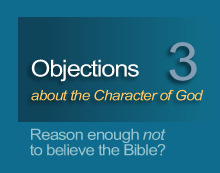WHY THIS?
This is a classic case of a biblical paradox; two seemingly contradictory verses.
The fact that neither verse has been struck from the texts suggests that, if the texts were long ago judged inspired, in-part for their consistency, there must be a good reason.
What is it?
"Christ redeemed us from the curse of the law by becoming a curse for us, for it is written: 'Cursed is everyone who is hung on a tree.'"
- Galatians 3:13
"Does God curse people for the sins of others? "
"The son will not bear the punishment for the father's iniquity, nor will the father bear the punishment for the son's iniquity..."
Ezekiel 18:20 NASB
"...for I, the Lord your God, am a jealous God, visiting the iniquity of the fathers on the children, on the third and the fourth generations of those who hate Me,"
Exodus 20:5 NASB
RESPONSE:
The first passage clearly states God does not curse people for the guilt of others while the latter appears God does. So which is it? The correct answer is he does not.
Passages such as those in Exodus which state God "visits the iniquity" of the fathers on the children to the third or fourth generation is referring to the consequences of the fathers' sins. Sin (iniquity) not only hurts sinners, but can also hurt those around them; especially family, and not just confined to the generation at hand. The effects of sin can be lasting. Few think about this when they sin, so God's warning is in good order.
It's not like if your father murdered someone, God then says you're a murderer, too. It's more like your father's act results in you grow up being teased, harassed, and developing an inferiority complex, and God points to the situation to say, "Here's yet more reasons why I don't want any of you murdering each other." He's not jumping the guilt from one person to the next, he's just allowing the effects. These effects can be both bad and multi-generational, but that is all part of why we should not sin in the first place. We're all in this together.
The effects of the sins are also seen in a family that moves out of a sales-tax-free state to a state where there is sales tax. As children in that family, we'd start having to pay sales tax - not as a penalty for our parents' relocation, but as a consequence. If we continued living there and had our own children, they'd pay sales tax, too, unless or until circumstances changed. No partiality on God's part here.
Another example: if a parent or expectant mother becomes an alcoholic or drug addict, their children are going to suffer. They will pass on the devastation in some form to their own children. The effects of such addictions are thus 'visited upon the generations'. Realistically, if you get drunk and beat your children, are you sure it's God's fault they cry when their classmates tease them about their black eye?
You might picture the effects of sin proceeding out from us like ripples on a lake. At this point in history, so many ripples have gone out and for so long, societal problems are about as choppy as we'd expect them to be; mesh upon mesh of wave interference obfuscating their origin(s) and making their solutions difficult if not impossible to isolate.
Is it fair that God allows the consequences of person A's sin to affect person B?
It is, because God warned Adam & Eve before either had sinned that specific actions have specific consequences. God instructed them and many others to pass on his warnings, and they have been - both verbally and in print. A&E sinned anyway and now you and I are dealing with it. We are not discreet entities that have no influence or effect on one another. They, and we, can't say we weren't warned.
See also:
What is the Gospel?



Expanded!